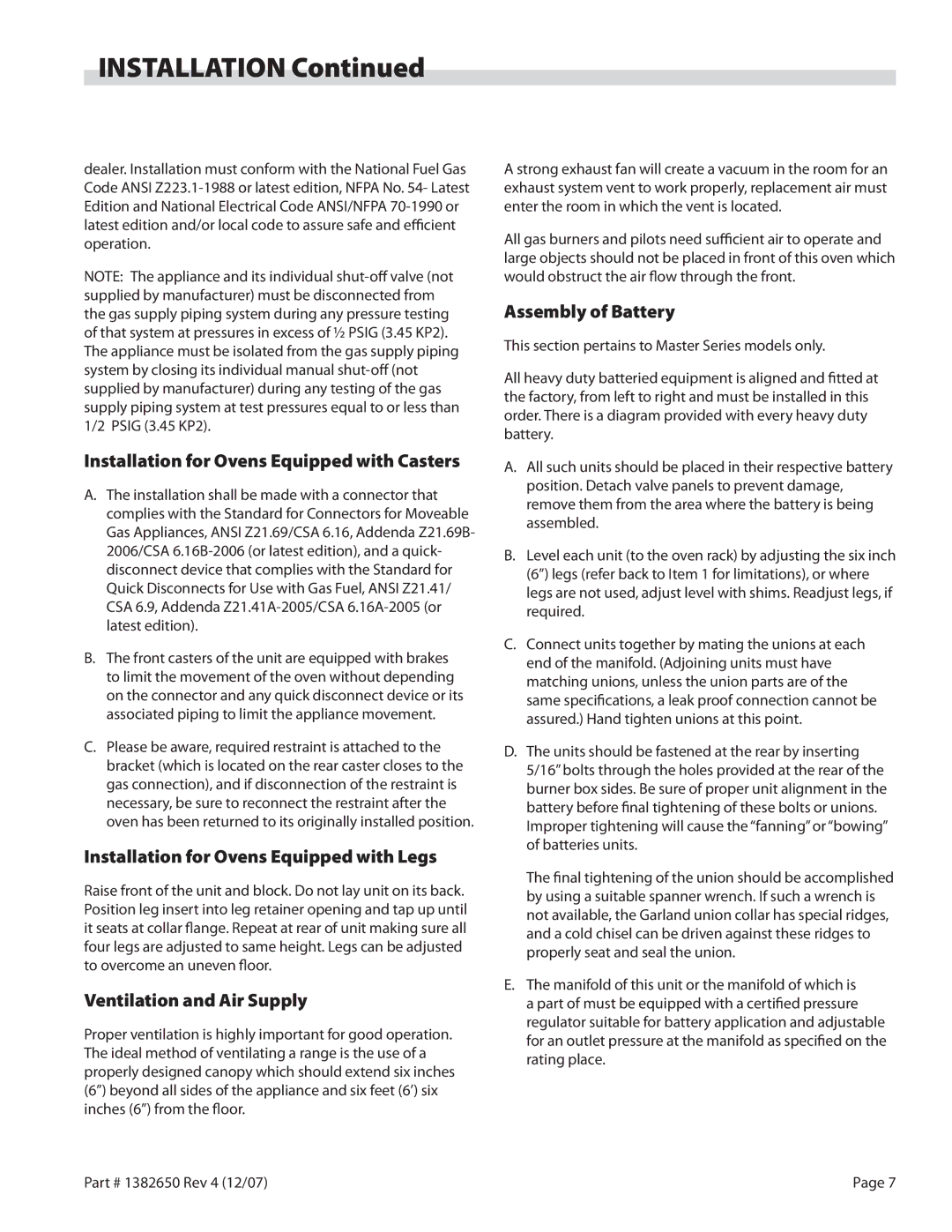INSTALLATION Continued
dealer. Installation must conform with the National Fuel Gas Code ANSI
NOTE: The appliance and its individual
Installation for Ovens Equipped with Casters
A.The installation shall be made with a connector that complies with the Standard for Connectors for Moveable Gas Appliances, ANSI Z21.69/CSA 6.16, Addenda Z21.69B- 2006/CSA
B.The front casters of the unit are equipped with brakes to limit the movement of the oven without depending on the connector and any quick disconnect device or its associated piping to limit the appliance movement.
C.Please be aware, required restraint is attached to the bracket (which is located on the rear caster closes to the gas connection), and if disconnection of the restraint is necessary, be sure to reconnect the restraint after the oven has been returned to its originally installed position.
Installation for Ovens Equipped with Legs
Raise front of the unit and block. Do not lay unit on its back. Position leg insert into leg retainer opening and tap up until it seats at collar flange. Repeat at rear of unit making sure all four legs are adjusted to same height. Legs can be adjusted to overcome an uneven floor.
Ventilation and Air Supply
Proper ventilation is highly important for good operation. The ideal method of ventilating a range is the use of a properly designed canopy which should extend six inches (6”) beyond all sides of the appliance and six feet (6’) six inches (6”) from the floor.
A strong exhaust fan will create a vacuum in the room for an exhaust system vent to work properly, replacement air must enter the room in which the vent is located.
All gas burners and pilots need sufficient air to operate and large objects should not be placed in front of this oven which would obstruct the air flow through the front.
Assembly of Battery
This section pertains to Master Series models only.
All heavy duty batteried equipment is aligned and fitted at the factory, from left to right and must be installed in this order. There is a diagram provided with every heavy duty battery.
A.All such units should be placed in their respective battery position. Detach valve panels to prevent damage, remove them from the area where the battery is being assembled.
B.Level each unit (to the oven rack) by adjusting the six inch (6”) legs (refer back to Item 1 for limitations), or where legs are not used, adjust level with shims. Readjust legs, if required.
C.Connect units together by mating the unions at each end of the manifold. (Adjoining units must have matching unions, unless the union parts are of the same specifications, a leak proof connection cannot be assured.) Hand tighten unions at this point.
D.The units should be fastened at the rear by inserting 5/16” bolts through the holes provided at the rear of the burner box sides. Be sure of proper unit alignment in the battery before final tightening of these bolts or unions. Improper tightening will cause the “fanning” or “bowing” of batteries units.
The final tightening of the union should be accomplished by using a suitable spanner wrench. If such a wrench is not available, the Garland union collar has special ridges, and a cold chisel can be driven against these ridges to properly seat and seal the union.
E.The manifold of this unit or the manifold of which is a part of must be equipped with a certified pressure regulator suitable for battery application and adjustable for an outlet pressure at the manifold as specified on the rating place.
Part # 1382650 Rev 4 (12/07) | Page |
